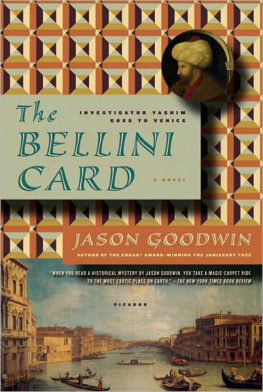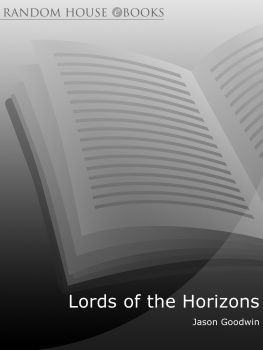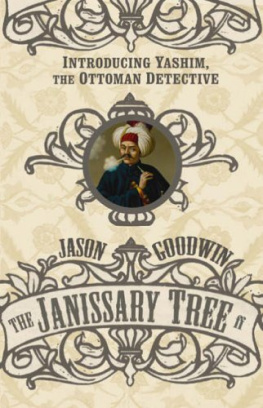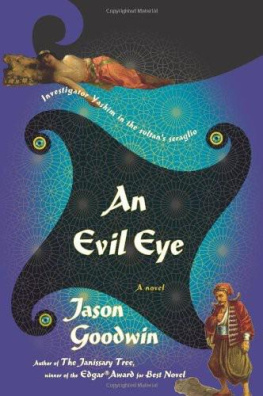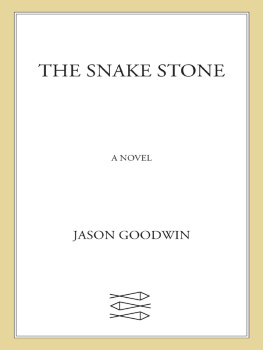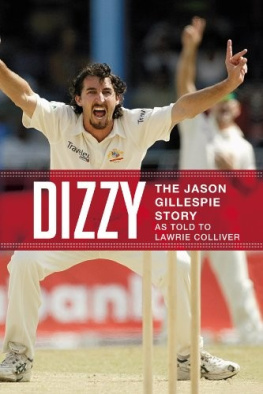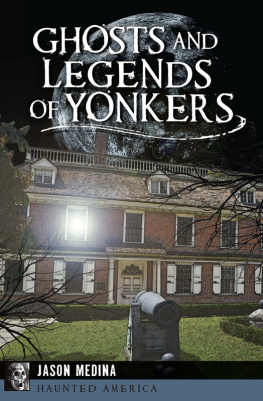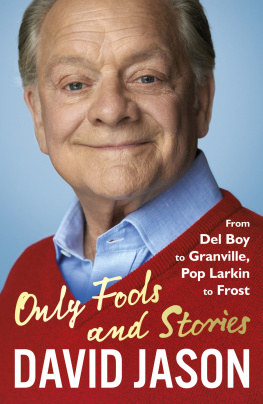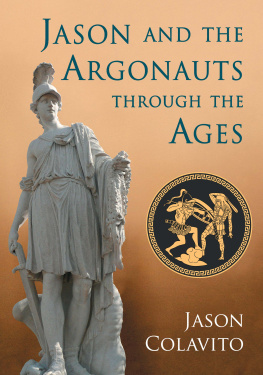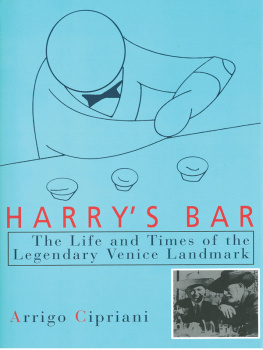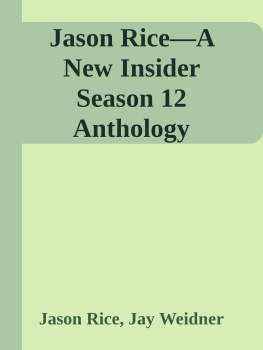ALSO BY JASON GOODWIN
Fiction
The Janissary Tree
The Snake Stone
Nonfiction
A Time for Tea:
Travels Through China and India in Search of Tea
On Foot to the Golden Horn:
A Walk to Istanbul
Lords of the Horizons:
A History of the Ottoman Empire
Greenback:
The Almighty Dollar and the Invention of America

a novel
JASON GOODWIN
SARAH CRICHTON BOOKS
Farrar, Straus and Giroux
New York
SARAH CRICHTON BOOKS
Farrar, Straus and Giroux
18 West 18th Street, New York 10011
Copyright 2008 by Jason Goodwin
All rights reserved
Distributed in Canada by Douglas & McIntyre Ltd.
Printed in the United States of America
Originally published in 2008 by Faber and Faber Ltd., Great Britain
Published in the United States by Sarah Crichton Books /
Farrar, Straus and Giroux
First American edition, 2009
Library of Congress Cataloging-in-Publication Data
Goodwin, Jason, 1964
The Bellini card / by Jason Goodwin.1st American ed.
p. cm.
ISBN-13: 978-0-374-11039-0 (hardcover : alk. paper)
ISBN-10: 0-374-11039-5 (hardcover : alk. paper)
1. Yashim (Fictitious character : Goodwin)Fiction.
2. EunuchsTurkeyFiction. 3. ArtCollectors and
collectingFiction. 4. Art dealersCrimes againstItaly
VeniceFiction. 5. Venice (Italy)Social life and customs
19th centuryFiction. 6. Istanbul (Turkey)Social life and
customs19th centuryFiction. I. Title.
PS3607.O59227B45 2009
813.6dc22
2008053238
Designed by Cassandra J. Pappas
www.fsgbooks.com
1 3 5 7 9 10 8 6 4 2
For Bibby
Comera, dovera
[As it was, where it was] VENETIAN MOTTO
Never judge a painting or a woman by candlelight. VENETIAN PROVERB
Contents

H E sank slowly through the dark water, arms out, feet pointed: like a Christ, or a dervish, casting a benediction on the sea.
The stone at his feet hit the mud with a soft explosion, his knees buckled, and in a moment he was bowing gracefully with the tide. He had always been graceful, pliant, too, when fixing a price, a man who traded and left something in the deal for the other fellow.
Overhead, the killer turned his head from side to side, alert to the slightest motion in the darkness, feeling the rain on his face. He stood for a few minutes, waiting and watching, before he blinked, turned, and padded softly from the bridge, to be swallowed up by the night and the alleyways of the sleeping city.
The tide ebbed. The water sucked at the green weed that lined the walls, gurgled around old pilings, and slipped and receded from worn stone steps. It sank, nudging the trader closer to the sea on which, in her days of glory, the city had made her fortune. Beneath Byzantine domes, dilapidated palaces, and tethered boats the corpse was hustled noiselessly toward the sea, arms still flung wide in a gesture of vacant welcome.
Yet some obstruction, a block of stone or loop of rotten rope, must have checked his passage for a time, for when dawn broke, and the tide slackened, the trader was still yards away from the deep waters of the Riva dei Schiavoni into which he would have otherwise sunk without further trace.

T HE sultan gave a high-pitched sneeze and patted his face with a silk handkerchief.
The Queen of England has one, he said petulantly.
Resid Pasha bowed his head. King William was dead, like Sultan Mahmut. Now, he thought, England and the Ottoman Empire were being ruled by little girls.
As the sultan says, may his days be lengthened.
The Habsburgs have several galleries, I understand. In their dominions in Italy, whole palaces are stuffed with pictures. The sultan dabbed at his nose. The Emperor of Austria knows what his grandfathers grandfather was like by looking at his picture, Resid Pasha.
The young pasha folded his slender hands in front of him. What the sultan said was true but perfectly ridiculous: the Habsburgs were notoriously ugly, notoriously alike. They married their close relations, and the chins got bigger every generation. Whereas an Ottoman prince had none but lovely and accomplished women to share his bed.
Resid Pasha tensed his shoulders. The Austrian dogs always piss on the same spot, he said with a jocular grunt. Who would want to see that?
Even as he spoke, he knew he had made a mistake. Sultan Mahmut would have grinned at the remark, but Mahmut was dead.
The sultan frowned. We are not speaking of dogs now.
You are right, my padishah. Resid Pasha hung his head.
I speak of the Conqueror, Abdlmecid said loftily. Of the blood in these veins. He held out his wrists, and the young counselor bowed, abashed.
If the picture exists, I wish for it, the sultan continued. I want to see it. Do you desire, Resid Pasha, that the likeness of the Conqueror should be exposed to the infidel gaze, or that an unbeliever should possess it?
Resid Pasha sighed. And yet, my sultan, we do not know where the painting might be. If, indeed, it exists at all.
The young padishah sneezed again. While he examined his handkerchief, the pasha pressed on: For more than three centuries, nobody ever saw or heard about thispicture. Today we have a rumor, nothing more. Let us be cautious, my padishah. What does it matter if we wait another month? Another year? Truth is like musk, whose grateful odor can never be concealed.
The sultan nodded, but not in agreement. There is a faster way, he said, in a voice treacled with mucus.
Send for Yashim.

C LOSE to the shoreline of the Golden Horn, on the Pera side, stood a fountain set up by an Ottoman princess as an act of generosity, on a spot where the boatmen used to linger and drop their fares. Hundreds of fountains existed in the streets and squares of Istanbul, but this one was particularly old and lovely, and Yashim had admired it many times as he passed. Sometimes, in hot weather, he would rinse his face in the trickle of clear water that splashed down onto the tiled basin.
It was those tiles that now stopped him on the street, where he stood unnoticed and aghast in the stream of traffic passing along the shore: muleteers with their trains, porters under enormous sacks, two fully veiled women attended by a black eunuch, a bashi-bazouk on horseback, his sash stuffed with pistols and swords. Neither Yashim nor the ruined fountain attracted anyones attention: the crowd flowed around him, a man standing alone in a brown cloak, a white turban on his head, watching stricken as a trio of workmen in overalls and dirty turbans attacked the fountain with their sledgehammers.
It was not that Yashim lacked presence; his only lack was of something more definite. But he was used to passing unnoticed. It was as though his presence were a quality he could choose to display or to conceal, a quality that people would be unaware of until they found themselves mesmerized by his gray eyes, by his low, musical voice, or by the truths he spoke. Until then, though, he might be almost invisible.
The workmen did not look up as he approached. Only when he spoke did one of them glance around, surprised.
Its the bridge, efendi. Once this has gone, then the tree, therell be a way through here, see? Got to have a way through, efendi.
Yashim pursed his lips. A bridge linking Pera to the main city of Istanbul had been talked about for years, centuries, even. In the sultans archives in Topkapi Palace Yashim had once seen a sepia design for such a bridge, executed by an Italian engineer who wrote his letters back-to-front, as if they were written in a mirror. Now, it seemed, a bridge was about to be builtthe new sultans gift to a grateful populace.
Next page
